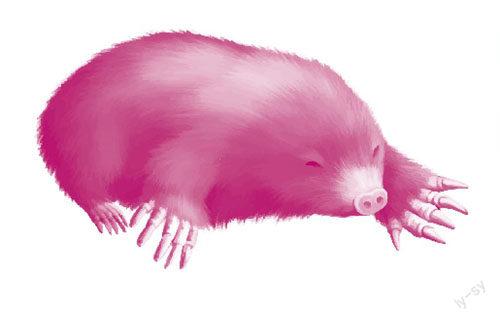The Wild Wood 野树林
Kenneth Grahame



——肯尼斯·格雷厄姆
本文选自《柳林风声》第三章。作者肯尼斯·格雷厄姆(1859—1932)是英国经典儿童文学作家。本文讲述的是鼹鼠在一个冬日下午独自进入野树林,结果在林中迷了路……本文从动物的视角来观察和感受大自然,让我们感受到小动物们之间的关爱和温情以及对大自然的敬畏。
The Mole had wanted for a long time to meet the Badger. He often spoke about his wish to the Water Rat, “Shall we go and visit him?” suggested the Mole. “Oh, no!” the Rat said, quite alarmed. “Hes very shy, and he wouldnt like that at all. I know him very well, but I've never visited his home. He lives right in the middle of the Wild Wood.”
“You said you would tell me about the Wild Wood,” said the Mole, “but you never did. Arent they very nice people in there?”
“Well,” replied the Rat, “the squirrels and the rabbits, most of them are all right. And Badger, of course. But I think we won't go there just now. It's a long way, and the Badger wouldn't be at home at this time of year. He'll come along one day if you wait quietly.”
But the summer passed and the Badger never came along. Soon the days grew shorter, and the cold weather kept the animals inside their comfortable houses. The Rat slept a lot in the winter, going to bed early and getting up late.
很长时间以来,鼹鼠一直想见灌,他时常把这个愿望告诉水鼠。“我们是不是应该去拜访他?”鼹鼠提议。“噢,不!”水鼠惊恐地答道,“他非常害羞,他根本就不喜欢有人来访。我跟他很熟,但我从没去过他家。他就住在野树林中间。”
“你说过要告诉我一些关于野树林的事,但你从没谈过。他们那儿的人不是很好吗?”鼹鼠问道。
“喔,”水鼠说,“松鼠很好,还有野兔中的大多数都不错,当然还有灌。但我想咱们现在还是不去的好。路远着哩!何况这个季节他也不在家。你只管安心等着,他总有一天要来这儿的。”
但是夏天过去了,獾还是没来过。不久,白天越来越短,寒冷的天气使得动物们都待在他们舒适的家里。水鼠在冬季也是早睡晚起,瞌睡很多。
One afternoon, while the Rat was sleeping peacefully in front of the fire, the Mole decided to go out by himself and take a walk in the Wild Wood. “Perhaps,” he thought, “I'll meet Mr Badger, and then I can introduce myself.”
It was a cold afternoon, with a hard grey sky. The Mole hurried along, enjoying the quietness of the winter day, and after a time he saw in front of him the black shape of the Wild Wood.
Everything was very still now, and the darkness seemed to come down quickly, shutting the Mole off from the outside world. The Mole thought that he saw a face looking at him from a hole, a little narrow face, with hard unfriendly eyes. When he turned to look straight at it, the thing had disappeared. He hurried on, telling himself not to be silly. He passed an other hole, yes! Eyes were looking at him, then disappearing again into the darkness. The Mole felt he had to get away from these faces. He turned off the path and hurried into the thickest part of the wood.
一天下午,水鼠在火爐前安睡,鼹鼠决定独自出去,到野树林里散散步。他想:“也许我能碰见灌先生,然后我可以做个自我介绍。”
那天下午很冷,天空阴沉沉的。鼹鼠向前赶着路,享受着冬日里的宁静,一会儿,他就看见了前面野树林黑黝黝的轮廓。
现在一切非常安静,黑暗似乎一下子笼罩下来,将鼹鼠与外面的世界隔绝开来。鼹鼠觉得他看见了一张脸正从一个洞里盯着他:一张小小的、窄窄的脸,露出一双锐利而不友善的眼睛。当他转过去直视他时,那小东西便不见了。他一边向前奔着,一边告诉自己不要犯傻。他走过一个又一个洞,是的!一双双眼睛在盯着他,然后又消失在黑暗里。鼹鼠感到他得避开这些脸,于是他离开这条道,向树林最茂密处奔去。
Then the whistling began. The Mole stopped and listened, then went on again. He was trying hard to stay calm, but his heart was beating very fast. He was alone, and far from help, and the night was coming down quickly. Then the pattering began. Then the noise grew louder and nearer, and the Mole knew what it was. It was the sound of little feet on all sides of him.
The frightened Mole began to run too, but he did not know where he was. He ran into trees and bushes, he fell over things and dodged round things, he picked himself up and ran on. At last he found a deep dark hole in the bottom of an old tree and fell into it, too tired to run another step. He lay there, shaking with fear, and listened to the whistlings and the patterings outside.
Now he understood why the Rat did not want to talk about it, and why other small animals from the fields and the river bank never came here. Because now, the Mole had felt terror of the Wild Wood.
這时,口哨声响了。鼹鼠停下来,听了一会儿,然后继续向前赶路。他努力使自己平静下来,但他的心跳得飞快。他孤立无援,而且夜幕很快就要降临了。然后啪嗒声开始响了。声音越来越大,越来越近,鼹鼠知道是什么了。这是小脚奔跑的声音,萦绕在他的四周。
鼹鼠吓坏了,也开始跑,但他不知道自己身在何处。他跑进树林和灌木丛里,忽而摔倒在什么东西上,忽而又绕过什么东西,然后爬起来继续跑。最后他发现一棵老树,树的根部有个深深的黑洞,他掉了进去,累得再也跑不动了。他躺在那儿,听着外面的哨声和脚步声,吓得浑身发抖。
现在他知道了为什么水鼠不想谈论野树林,为什么田野和河岸上别的小动物从不来这儿,因为现在鼹鼠自己感受到了野树林的恐怖。
Vocabulary
narrow adj.狭窄的;有限的;勉强的
whistling n.口哨声,啸声
frightened adj.害怕的,受惊的
dodge v.闪开,躲开;逃避

